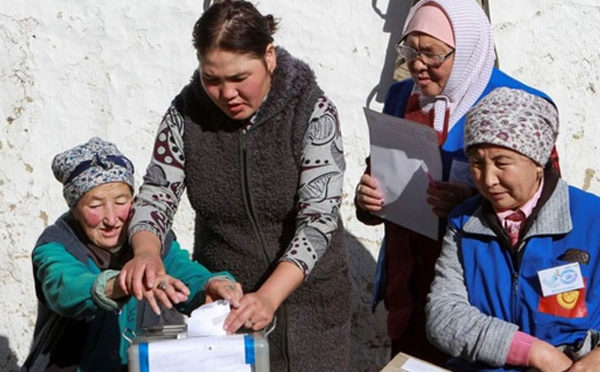Of Protests, Elections and a Referendum
Posted on : January 18, 2021Author : AGA Admin

2021 began with elections and a referendum in two Central Asian states, Kazakhstan and Kyrgyzstan. Expectations of any significant transformation were limited and the electoral scene was pervaded by an inevitability of the results. The elections, however, were not without symbolic significance. For Kazakhstan, this was the first post-Nazarbayev legislative council election with expectations of transition to a ‘new’ government. For Kyrgyzstan, where Parliamentary election results had to be annulled after street protests in October 2020, the victory of Kyrgyz nationalist politician Sadyr Japarov, with an agenda to fight corruption and bring ‘openness’ and ‘transparency’ to government and more significantly the possibility of a return to Presidential rule through a simultaneous referendum portended the probability of a new turn in Kyrgyz politics. In both cases the results were seen as foregone conclusions with the Nur Otan party sharing power with two government-friendly partners, the Ak Zhol and Peoples’ Party in the Kazakh Parliament and the overwhelming majority of votes favouring a Presidential system in Kyrgyzstan with Sadyr Japarov as the chosen leader. However, there was a significant difference in political activism in the two states with the Kyrgyz elections being one of the most polarizing as voters determined not just their chosen leader but also their preferred political system.
The last Kazakh transition was in March 2019, when the then President Nursultan Nazarbayev had made way for his chosen successor the present President Kassym Jomart Tokayev beginning a process of transition that was expected to be continued through the legislative council elections. The elections, however, saw no serious opposition and witnessed the detention of protestors in major cities including the capital. Continuity remained the theme of politics with Nazarbayev in his role as the Chairman of the Nur Otan Party clearly arguing that only ‘a consolidated society united around a single political force can succeed’ in the backdrop of the pandemic. However, there were some concessions to evolving social and demographic trends with the Nur Otan party declaring that at least one third of its party members were women and that compared to the 2016 elections the average age of candidates had been reduced by four years to 48 years. However, the only party that styles itself as the opposition, the Nationwide Social Democratic Party ruled itself out of the contest as a protest against what it considered to be unfair political practices and the campaign itself was subdued with little scope for voters to make informed choices. The Majlis once again added new and old faces. However, the elections were not without critical elements of power play with Dariga Nazarbayeva, former President Nazarbayev’s daughter and former Chair of Senate set to enter the Majlis once again and possibilities of changes to the constitutional order with the Majlis emerging as a more potent factor balancing the power of the President, a process set in motion by Nazarbayev in the last years of his Presidency as a means to curtail the power of the new President.
The result of the referendum in Kyrgyzstan however, is set to dilute the influence of the Parliament by handing sweeping powers to the President. Parliamentary elections in October 2020 had been expected to bring back a largely status quo legislature. However, the then President Sooranbai Jeenbekov had been unprepared for the protests that followed with the realization that the carefully engineered elections had allowed only four of sixteen parties to pass the threshold of entry. The Kyrgyz Parliament building known as the White House was stormed and detained political leaders including the former President Almazbek Atambayev and Kygyz nationalist politician Sadyr Japarov were released. Japarov, was subsequently elevated by his supporters to become Prime Minister and was then voted by lawmakers as acting President. Thereafter the elections became a formality with Japarov handing over interim power to his ally Talant Mamytov to be able to contest elections. Japarov had entered local politics during a border delimitation dispute with Kazakhstan regarding Kyrgyz pastures east of Keng Suu but entered national politics in the post Akayev period as a member of the Ak Zhol party of President Kurmanbek Bakiyev. With Bakiyev’s defeat Japarov moved to the new and nationalist Ata Jurt party. Convicted in the Karakol hostage incident Japarov was released from imprisonment in the chaos that followed the declaration of the results of the October elections. While Japarov won the elections with a large majority bringing to end months of uncertainty, the results of the referendum also brought to an end the power-sharing arrangements between the President and the Parliament that had been adopted in 2010 after street protests had forced two successive Presidents to give up power.
In Central Asia elections remain an incremental stage in a slow and ongoing political transition. What is probably more significant are other civic actions and street protests that are now a part of the political process. In recent years food shortages, the rising price of staples and housing shortages have been common themes for protests across the region though specific issues dominated protests in the states. While most protests in Kazakhstan were related to the state’s transition of power, in Kyrgyzstan protests centered round the theme of ‘justice’ and the detention of political leaders. In Uzbekistan, the connected issues of land ownership and attempts by the government to demolish or evict people from their property led to protests in the more liberal post-Karimov era. It is these calls for political reform that indicate the need for a critical look at stereotypical images reflecting deference for elders or ‘hurmat’ that was often translated into obedience towards authorities in the societies of the region. They also call for greater attention to the potential of street protests for ‘remaking’ the political space that is then legitimized through elections.
Anita Sengupta
Director, Asia in Global Affairs





Leave a Reply